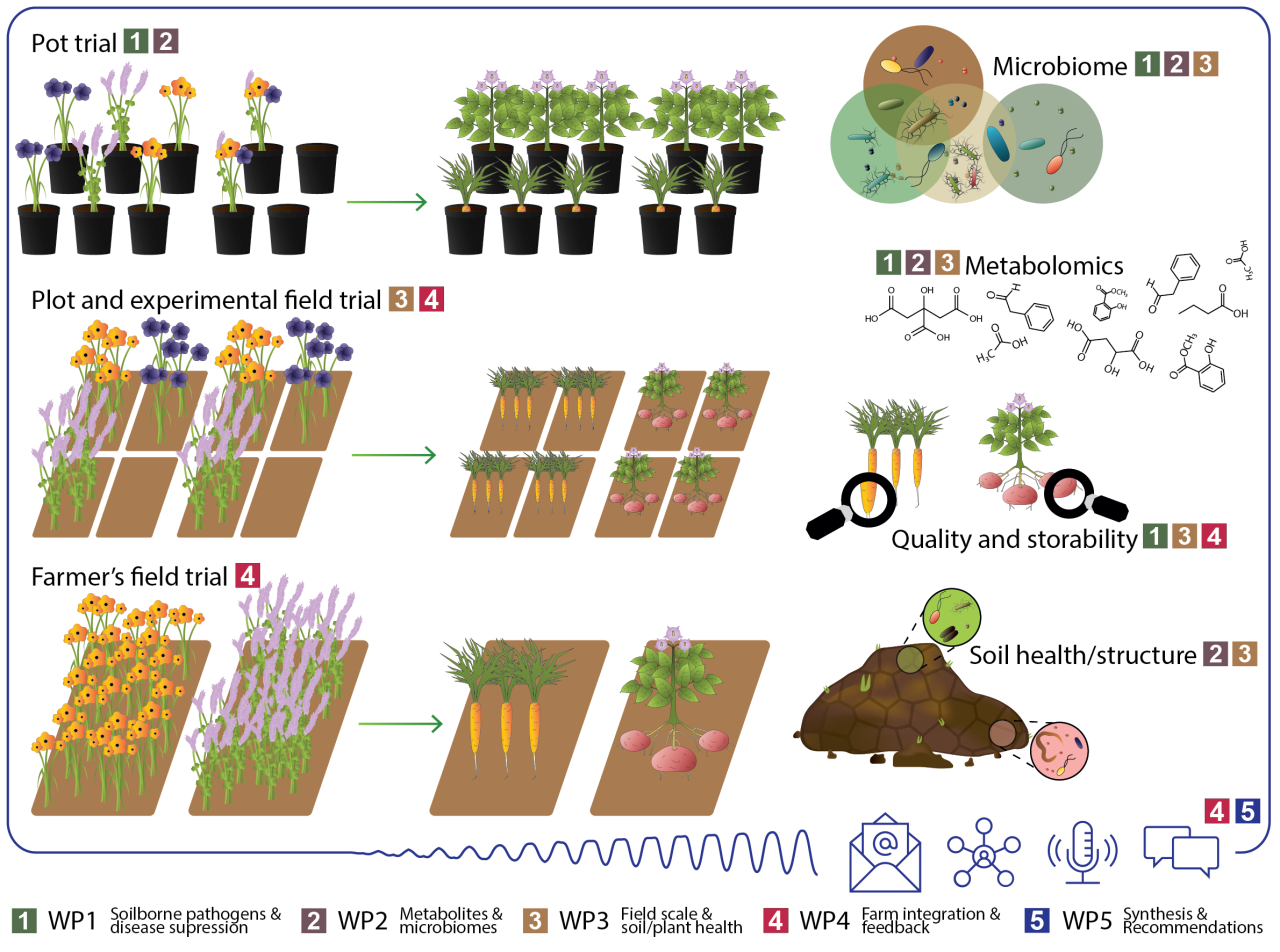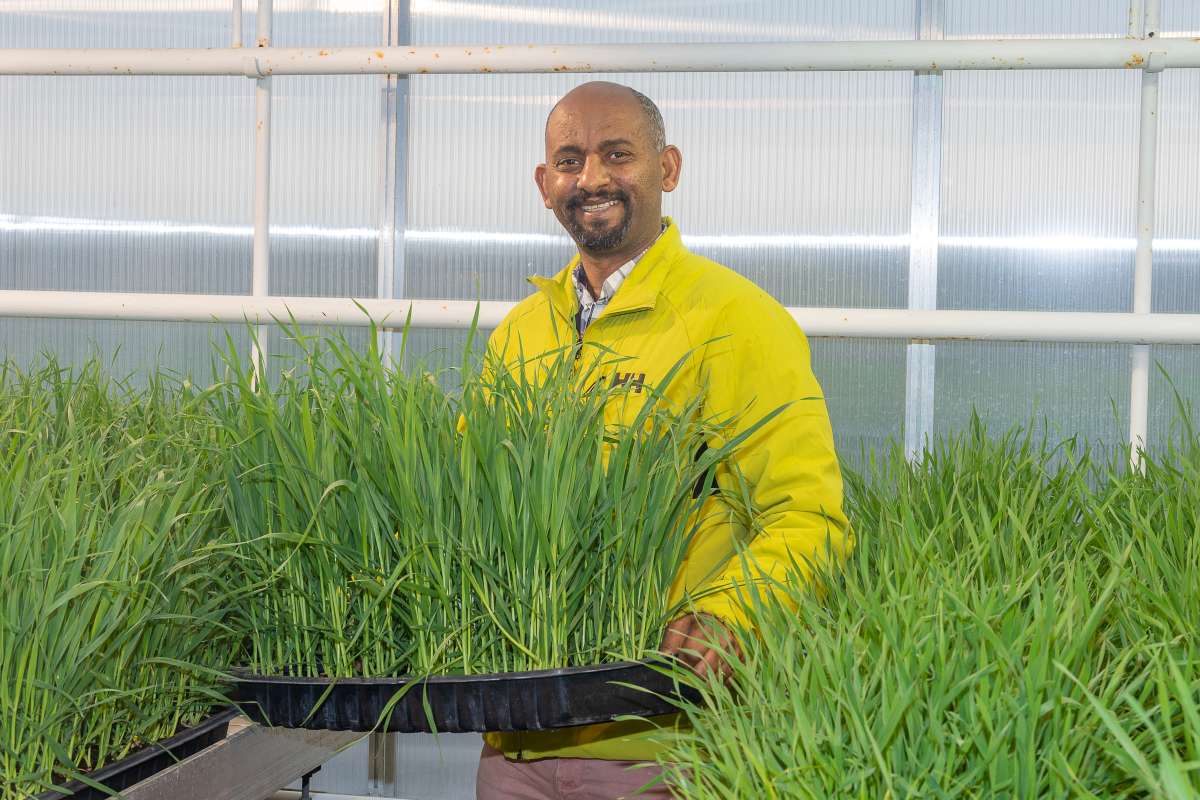Divisjon for bioteknologi og plantehelse
Cropdrive

Slutt: des 2027
Start: mars 2023
Cropdrive aims to identify a selection of cover crops suitable for use in root vegetable and potato production with beneficial impacts on both soil and plant health, and greenhouse gas exchange.
Prosjektmedarbeidere
Mette Thomsen Anders Aas Simon Weldon Belachew Asalf Tadesse Håvard Eikemo Marit Skuterud Vennatrø Marte Persdatter Tangvik Arne Hermansen Lada Ivanova Oscar Daniel Rangel-Huerta Borghild Glorvigen Reidun Pommeresche Tatiana Francischinelli Rittl Solveig Haukeland Marianne Stenrød Marit Almvik Simeon Rossmann| Status | Pågående |
| Start- og sluttdato | 01.03.2023 - 31.12.2027 |
| Prosjektleder | Ivo Havranek Guldberg |
| Divisjon | Divisjon for bioteknologi og plantehelse |
| Avdeling | Pesticider og naturstoffkjemi |
| Finansieringskilde | Research Council of Norway |
We will test a number of cover crops and measure trends in the occurrence of primary and secondary metabolites, e.g., amino acids, organic acids and phenols in the root zone. We will evaluate how these metabolites affect the growth and quality of potatoes and carrots.
Further validation of the proposed cover crops will be done under field conditions in experimental fields and with selected growers, with measurements of selected parameters for good soil health, -structure and -physical conditions, greenhouse gas exchange, occurrence of soilborne plant pests and effects on crop quality in the field and during storage.
The output from Cropdrive will provide documented recommendations on the choice of cover crops and necessary adaptations of cropping practices to ensure successful use in root vegetable and potato production.
The project will be a collaboration between research institutes, value chain partners (agricultural advisers, farmers associations, industry partners), administrative bodies in agriculture and food safety, and international scientific experts.
Publikasjoner i prosjektet
Sammendrag
Jordhelsefremmende tiltak bør tilpasses i konkrete planteproduksjoner for å ikke bli en del av problemet med jordbårne sykdommer, særlig i dyrkingssystemer der man ikke ønsker å bruke plantevernmidler. For å få det beste ut av vekstskifte og tilført organisk materiale, i forhold til sykdomsforebygging, må man lese seg opp på hvilke vekster som passer best etter hverandre og sammen. Det er også viktig å velge sorter av kulturvekster som er resistente eller motstandsdyktige og om mulig sorter som passer i økologisk drift. Ved å tilbakeføre organisk materiale, bruke vekstskifte og fangvekster for å fremme jordhelsa får man ikke en helt sykdomsfri jord, men man tilrettelegger for god jordstruktur, økt biologisk aktivitet, mangfold i jorda. Da får jorda også større motstandskraft mot klimasvingninger som tørke og store nedbørsmengder. Alt dette bidrar til å holde nivået av plantesykdommer lavt og kulturplantene friske. En del sykdomsforebygging ligger i god jordhelse, men ikke alt.
Forfattere
Belachew Asalf TadesseSammendrag
Det er ikke registrert sammendrag
Sammendrag
Black scurf and stem canker on potatoes, caused by the destructive soil-borne pathogen Rhizoctonia solani Kühn are a major problem for potato growers worldwide. Biological control agents such as plant leaf extracts can influence the severity of R. solani infection and help to reduce the risks to human health and the environment associated with the use of hemical fungicides. In this study, the inhibitory effect of the secondary plant metabolites aucubin, catalpol (iridoid glucosides) and acteoside (phenylethanoid glycoside) from methanolic extracts of Plantago lanceolata (Ribwort plantain (en), Smalkjempe (no)), a native plant in the Nordic countries, on the growth of R. solani mycelium on potato dextrose agar growth medium will be tested for the first time. Plant extracts will be obtained from plants of different age classes and metabolic profiling will be performed with LC-(HR)MS analyses and the concentrations of identified metabolites will be determined. To analyse whether the inhibitory interactions on fungal growth originate from the known secondary metabolites or are caused by the bulk plant extract, we will first expose the fungus to different concentrations of extracts, redissolved in aqueous solution and added to the growth medium, and in a further step we will carry out the same approach with the isolated secondary metabolites as pure substances. The fugus will be incubated for 5 days and the mycelium growth radius will be measured every 24 hours during incubation. Thereafter a suppression index will be calculated and compared to the untreated control. The results are pending at the time of submission of the abstract but will provide a good initial understanding to determine whether extracts of P. lanceolata can be used as a natural biological control agent as an additional component of a more sustainable strategy to manage the risk of infection of potato with R.solani and to reduce the severity of the disease caused by this pathogen.
Sammendrag
Det er ikke registrert sammendrag

